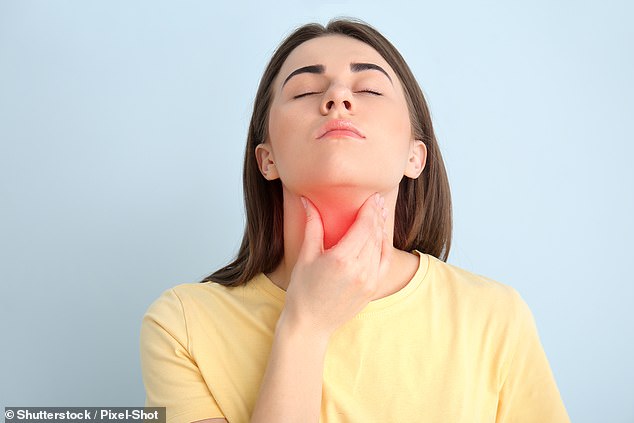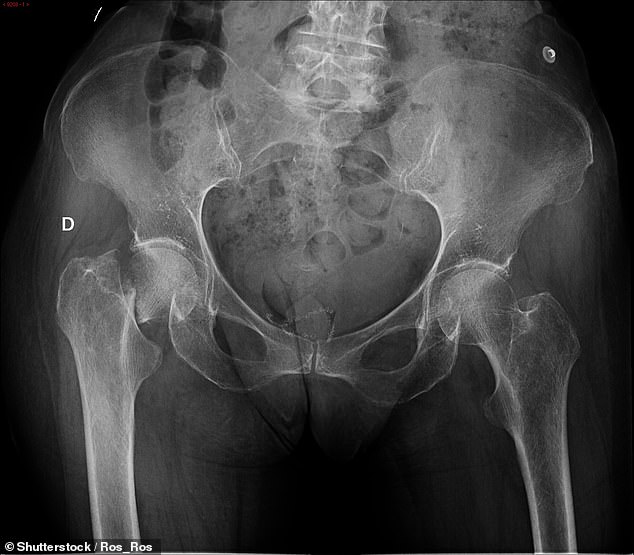Warning, as one of the most prescribed medications in America can cause a debilitating bone disease called osteoporosis
One of the most common prescription drugs could put you at greater risk for bone density loss, according to new research.
About 23 million Americans use levothyroxine, also known by the brand name Synthroid, every day, making it the second most commonly used drug among older adults in America.
It is prescribed to people who have problems with their thyroid, a butterfly-shaped gland in the neck that regulates energy, weight and hair growth. Hypothyroidism affects about one in twenty Americans over the age of 12.
Older research has found that having too much thyroid hormone in the body increases a person’s risk of bone fractures. Knowing this, researchers at Johns Hopkins examined the effect that taking levothyroxine had on bone health.
By studying dozens of people over six years, they found that people who took the drug were more likely to lose a greater amount of bone tissue than people who did not take the drug.
Professor Shadpour Demehri, an expert in radiology at John Hopkins University in Maryland and co-author of the study, said: ‘Our study suggests that even when current guidelines are followed, the use of levothyroxine appears to be associated with greater bone loss in older adults.”
Low bone density can cause a person to become more fragile and prone to bone fractures – a condition known as osteoporosis.
Levothyroxine, pills that cost just a few cents a day to combat the condition, may increase the risk of loss of bone mass and density

The thyroid is a gland in the neck that releases chemicals that control metabolism and energy
In the study, researchers assessed 81 patients who used levothyroxine and 364 non-users, with an average age of 73 years and a thyroid-stimulating hormone level of 2.35.
The research will be presented in full next week in Chicago at the annual meeting of the Radiological Society of North America.
Normal levels are typically 0.4 to 4.0 milliunits per liter (mU/L).
Over a six-year follow-up, they found that those taking levothyroxine suffered “greater loss of total body bone mass and bone density.”
Patients taking the drug who had “normal” thyroid-stimulating hormone levels also suffered loss of bone mass and density, the researchers added.
Dr. Jennifer Mammen, co-author of the study and associate professor of endocrinology at Johns Hopkins, said adults taking levothyroxine should discuss their treatment with a doctor and regularly monitor their thyroid function tests.
She said: ‘A risk-benefit analysis should be carried out, weighing the strength of the indications for treatment against the potential adverse effects of levothyroxine in this population.’
This could also indicate that Synthroid is being overprescribed, says Dr. Elena Ghotbi, lead author of the study and postdoctoral researcher at John Hopkins University.
Dr. Ghotbi said, “Data show that a significant portion of thyroid hormone prescriptions can be given to older adults without hypothyroidism.
This is not the first article to take a critical look at the drug. About 90 percent of people taking the drug may not need it, according to 2023 research from the Yale School of Medicine.
Dr. Joe El-Khoury, professor of laboratory medicine, who led the study, said: ‘Study after study has shown that there is a greater risk if you overtreat with levothyroxine in patients who may not need it.’
The Johns Hopkins researchers did not specifically study osteoporosis, but low bone density is a precursor to this condition, which affects about 10 million people over 50.

This X-ray shows a woman with a broken hip, which Yale says is one of the most debilitating fractures associated with osteoporosis. Thyroid problems are much more common in women than in men.
In osteoporosis, the holes in the bone become larger, causing the outer walls of the bone to become thinner, brittle and easily breakable.
If someone then takes a minor fall, they run the risk of major bone fractures, including hip fractures.
According to the Yale School of Medicine, these hip fractures can cause a person to lose mobility and independence and are associated with an earlier death.
Osteoporosis becomes much more common with age, but the chance of developing the condition increases if a person smokes, eats a poor diet, has arthritis or bone cancer.
In addition, hormones play a role in bone health. This includes thyroid hormones, sex hormones such as estrogen and testosterone, and growth hormones such as insulin.
Women are five to eight times more likely to develop thyroid problems than men.
It’s unclear what causes these conditions, but if left untreated, they can cause heart disease and infertility, according to the American Thyroid Association.
Researchers aren’t sure why thyroid hormones might cause these changes in bone. In a healthy body, scientists from the Imperial College London have shown that these hormones help control the rate at which new bone replaces cartilage, the dense spongy centers of bone.
This helps maintain bone health, including regulating the rate at which bone tissue is lost.
So the theory is that if there is too much thyroid hormone in the body, the rate at which bone tissue is lost exceeds the rate at which new bone is added, leading to osteoporosis.
Still, the research is mixed, and the Johns Hopkins team said more studies are needed to prove there is a link between the two.
